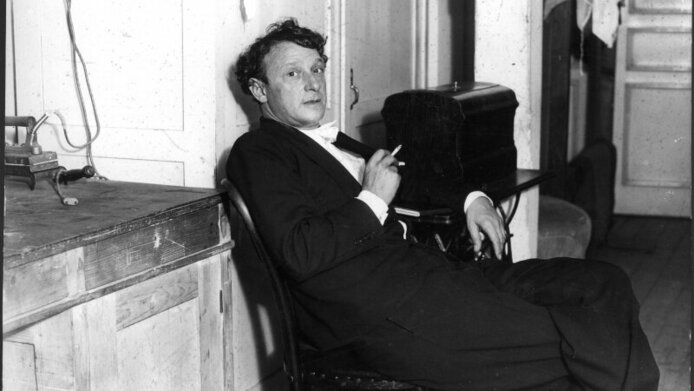Anton Kuh: writer and performer

“Publish or perish”, as the saying goes. Only those who leave written records will be remembered. In the case of Anton Kuh, scarcity of published material is not really a problem for the biographer Walter Schübler. In a previous project, also funded by the Austrian Science Fund FWF, Schübler edited seven volumes of the works of the Austrian author, who died in New York in 1941. With the support of the FWF, Walter Schübler has now embarked on a scientific treasure hunt in order to document Kuh’s ephemeral main oeuvre, his extempore speeches. “I was able to identify 75 extempore speeches and reconstruct at least their content on the basis of reviews. They represent the chronological milestones of the biography”, says Walter Schübler, thus submitting further proof that Anton Kuh was anything but an inconsequential coffeehouse writer.
Writer, speaker and boundary-pusher
As an extempore speaker, Kuh was “one of a kind. Kurt Tucholsky called him a Sprechsteller[1]. He was renowned for his sparkling wit, outstanding observations, brilliant verve, overwhelming rhetorical vigour, exhaustive expert knowledge, dazzling aphorisms, rousing temperament, etc.” Anton Kuh made his debut as a public speaker in Prague in 1917. Audiences flocked to the venues to hear him speak about topical issues under such titles as The Tragedy of Jewry, Shakespeare and Dada, Bourgeois Eroticism, Why are we out of money?, Nietzsche’s Walking Cane or the Petty Theatre of Race, or The Art of Surviving Hitler. In 1938, the Jewish writer had to leave Austria, which was not as hard on this restless nomad as it was on many others. Under the Nazi regime, his works were on the list of “damaging and undesirable writing.”
Live fast, die young
An author of several biographies, Walter Schübler explicitly refuses to follow the mould of the genre of Bildungsroman with an “omniscient narrator” who attempts to explain someone else’s life from cradle to grave. This biography is no exception and preserves the “flavour of the source”, providing background information on the era in which Kuh lived. The monograph starts with a “personal description”. Wherever possible, Schübler lets Anton Kuh speak for himself. “He lived an excessive life trying to cram as many heartbeats as possible into every minute of existence! His life’s motto was ‘Quod licet bovi, non licet Jovi’, or ‘what is permissible for Kuh[2] is hardly permissible for God’”, notes the scholar. Recently published by Wallstein, Walter Schübler’s monograph demonstrates that Anton Kuh was neither an insignificant local character nor a political featherweight. He was an eminently political person, and even at an early age he became “involved in the political debates of the day with his contributions, and as an avowed ‘lefty’, he risked life and limb in his reckonings with the Nazis”, says Schübler in the interview with scilog.
A touchstone for Karl Kraus
Schübler’s entrée into the reading of Kuh’s writings was a transcript of an extempore speech entitled Zarathustra’s Ape from 25th October 1925, in which Kuh took Karl Kraus to task: “One needs to know that in those days anyone who Karl Kraus attacked in the Fackel became a social outcast. Anton Kuh obviously couldn’t have cared less.” The “champion of contrariness” relentlessly teased Kraus for many years. The biographer’s appetite for Kuh’s texts is still undiminished: “Kuh’s writings reflect the insights of a quick-witted flâneur, someone wide awake to what was going on around him. His observations are sharply contoured, habitually devoid of respect or tact and not at all shy of calling a spade a spade. Intrinsically linked to the argument, his mockery is always analytical.” With his latest book, Schübler makes this writer from the Habsburg Monarchy, Weimar Republic and Austrian interwar period accessible to the public at large.
Personal details Walter Schübler is a graduate in Translation Studies at the University of Vienna and wrote his thesis on Rabelais. The author, whose main focus is biographical, lives in Vienna. Since 2005, most of Walter Schübler’s work has been devoted to the life and oeuvre of Anton Kuh in the context of FWF project grants.
Publications (in German)





